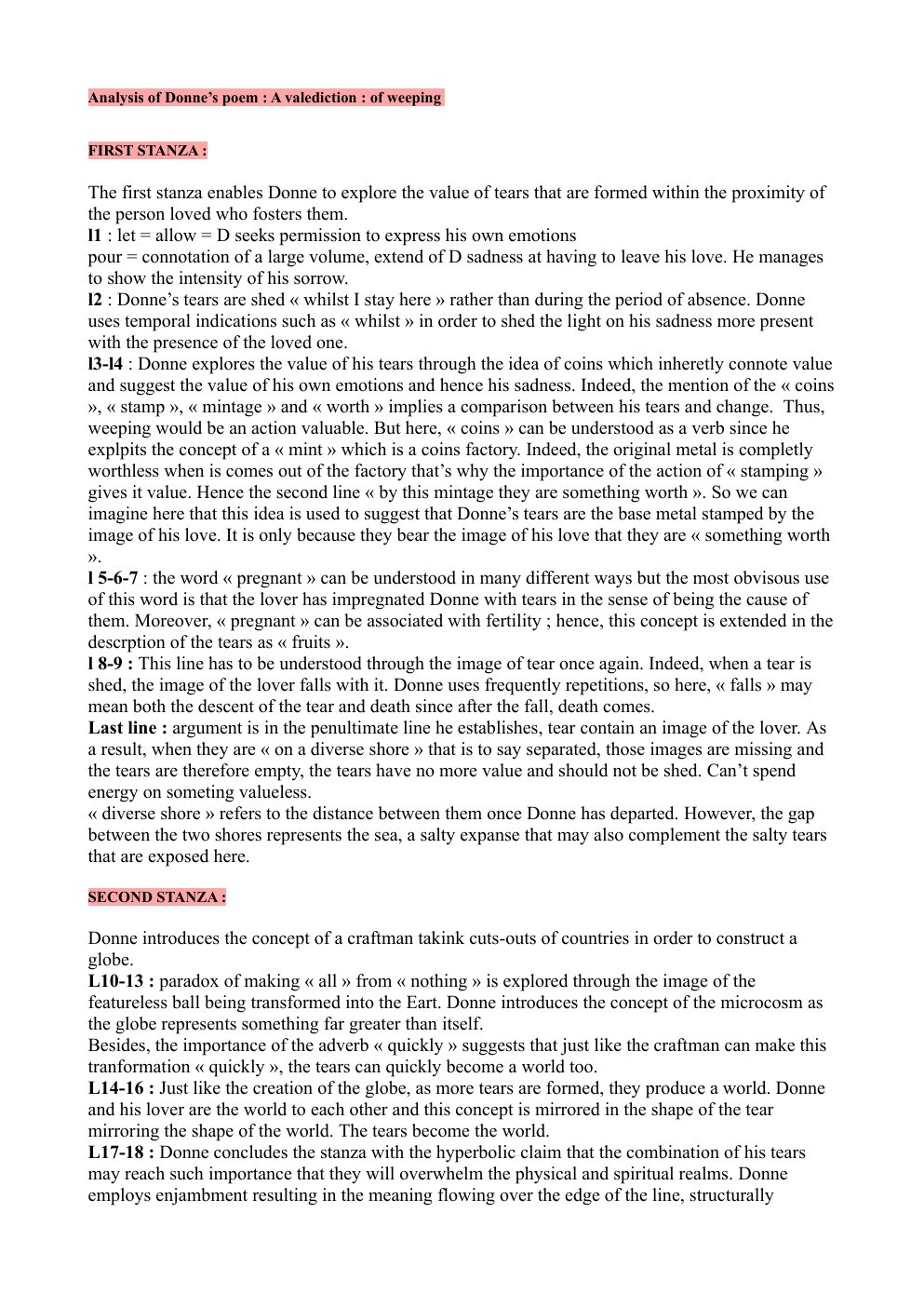Donne, A valediction : of weeping
Publié le 30/10/2022
Extrait du document
«
Analysis of Donne’s poem : A valediction : of weeping
FIRST STANZA :
The first stanza enables Donne to explore the value of tears that are formed within the proximity of
the person loved who fosters them.
l1 : let = allow = D seeks permission to express his own emotions
pour = connotation of a large volume, extend of D sadness at having to leave his love.
He manages
to show the intensity of his sorrow.
l2 : Donne’s tears are shed « whilst I stay here » rather than during the period of absence.
Donne
uses temporal indications such as « whilst » in order to shed the light on his sadness more present
with the presence of the loved one.
l3-l4 : Donne explores the value of his tears through the idea of coins which inheretly connote value
and suggest the value of his own emotions and hence his sadness.
Indeed, the mention of the « coins
», « stamp », « mintage » and « worth » implies a comparison between his tears and change.
Thus,
weeping would be an action valuable.
But here, « coins » can be understood as a verb since he
explpits the concept of a « mint » which is a coins factory.
Indeed, the original metal is completly
worthless when is comes out of the factory that’s why the importance of the action of « stamping »
gives it value.
Hence the second line « by this mintage they are something worth ».
So we can
imagine here that this idea is used to suggest that Donne’s tears are the base metal stamped by the
image of his love.
It is only because they bear the image of his love that they are « something worth
».
l 5-6-7 : the word « pregnant » can be understood in many different ways but the most obvisous use
of this word is that the lover has impregnated Donne with tears in the sense of being the cause of
them.
Moreover, « pregnant » can be associated with fertility ; hence, this concept is extended in the
descrption of the tears as « fruits ».
l 8-9 : This line has to be understood through the image of tear once again.
Indeed, when a tear is
shed, the image of the lover falls with it.
Donne uses frequently repetitions, so here, « falls » may
mean both the descent of the tear and death since after the fall, death comes.
Last line : argument is in the penultimate line he establishes, tear contain an image of the lover.
As
a result, when they are « on a diverse shore » that is to say separated, those images are missing and
the tears are therefore empty, the tears have no more value and should not be shed.
Can’t spend
energy on someting valueless.
« diverse shore » refers to the distance between them once Donne has departed.
However, the gap
between the two shores represents the sea, a salty expanse that may also complement the salty tears
that are exposed here.
SECOND STANZA :
Donne introduces the concept of a craftman takink cuts-outs of countries in order to construct a
globe.
L10-13 : paradox of making « all » from « nothing » is explored through the image of the
featureless ball being transformed into the Eart.
Donne introduces the concept of the microcosm as
the globe represents something far greater than itself.
Besides, the importance of the adverb « quickly » suggests that just like the craftman can make this
tranformation « quickly », the....
»
↓↓↓ APERÇU DU DOCUMENT ↓↓↓
Liens utiles
- Une nouvelle donne géopolitique : bipolarisation et émergence du tiers-monde (1947- 1975).
- La loi limite-t-elle la liberté ou lui donne-t-elle les moyens de se réaliser ?
- PLATON: «Ce qui donne naissance à une cité, c'est, repris-je, l'impuissance où se trouve chaque individu de se suffire à lui-même.»
- ÉVANGILE SELON SAINT JEAN: «Je vous donne un commandement nouveau: c'est de vous aimer les uns les autres...»
- La mort donne-t-elle valeur à la vie ?

































